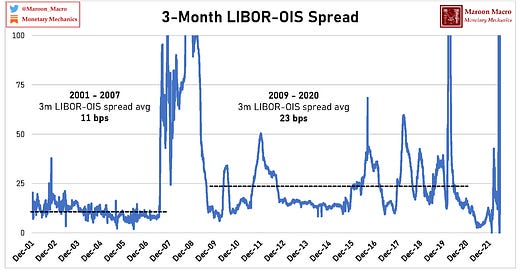In this issue of Monetary Mechanics, I am going to do a deeper dive into the concept of bank balance sheet capacity as money.
Just as a reminder, the Bank for International Settlements, who I agree with, defines “balance sheet capacity” as the following:
The banking sector has a well-defined “balance sheet capacity” that encapsulates its ability to take on risky exposures, and the fluctuation in this capacity is the engine that drives the financial cycle. The notion of “balance sheet capacity” sits uncomfortably with textbook discussions of how balance sheets are constructed.1
In this issue of Monetary Mechanics, I am going to transition from abstractions to some concrete examples that would better explain the concept of bank balance sheet capacity as money.
Bank Balance Sheet Capacity
Let’s consider a scenario in which an individual takes out a mortgage to buy a new house or a business takes out a loan to invest in a new factory. Immediately prior to the mortgage or loan being taken out, they did not even exist, and neither did the bank deposits associated with them.
However, this does not mean that the bank did not have the capacity to give out the mortgage or loan – there simply was no client/customer willing to take the other side yet.
The same concept can also be applied to the other side of the transaction. Just because the mortgage or loan was not taken out does not mean that the client/customer did not have the capacity to take out the mortgage or loan – there simply was no bank willing to take the other side yet. The consumer always had the ability to do so – it simply had not happened yet.
Let’s also consider the possibility that perhaps both the individual or business and the bank have the ability to participate in this transaction but choose not to for whatever reason. On the one hand, perhaps the individual or business is worried about the possibility of a downturn in the economy. On the other hand, perhaps the bank is worried about the possibility of repayment.
Personally, I believe that this distinction is one of the most important, but overlooked, concepts in money and banking. If money is considered as purchasing power, as something that enables the exchange of commerce, then what matters the most is the ability to undertake a transaction.





